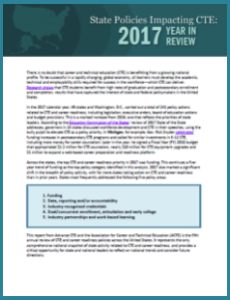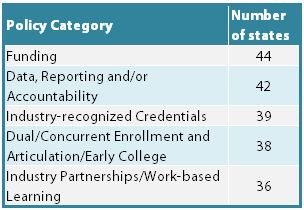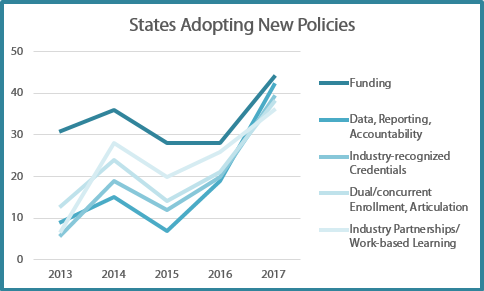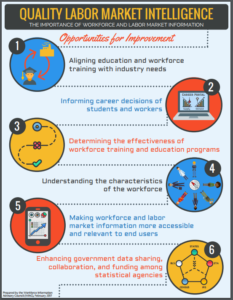As Congress continues its work on the Fiscal Year 2018 (FY18) appropriations process, efforts to encourage support for programs for FY19 are underway. Read below to find out how you can support a strong federal investment in Perkins and to learn about new updates from the U.S. Department of Education.
Contact Your Representative About Signing the FY19 Perkins Funding Letter
The two co-chairs of the House CTE Caucus (Representatives Langevin (D-RI) and Thompson (R-PA)) will be sending a letter to the Chairman, Tom Cole (R-OK) and Ranking Member, Rosa DeLauro (D-CT), of the Appropriations Subcommittee on Labor, Health and Human Services, Education and Related Agencies encouraging that they consider strong support for Perkins. Right now, Reps. Langevin (D-RI) and Thompson are asking for their colleagues in the House to join them in signing this letter (their request is formally called a “Dear Colleague” letter). Please consider contacting your Representative by March 14 to encourage him/her to sign on to the letter by using the Association for Career and Technical Education (ACTE) Action Center or by calling the Capitol Switchboard at 202-224-3121 and asking your Representative to sign onto the Fiscal Year 2019 (FY19) Perkins appropriations letter. Looking for resources on Perkins funding or how it’s used? Check out the new Perkins page on Advance CTE’s website.
New Resource: the Advancing Equity in CTE Community of Practice
The Advancing Equity in CTE Community of Practice is now live on the U.S. Department of Education’s Literacy Information and Communication Systems (LINCS) site. This moderated community offers CTE educators a forum to engage in thoughtful discussions and share tools and resources to increase equity in CTE programming. You can pose questions and help answer those of colleagues. In addition to facilitated discussions, other equity-focused professional learning opportunities will include webinars, interactive resource reviews, blog posts, and important event announcements.
U.S. Department of Education Releases Final Supplemental Priorities for Competitive Grants
On March 2, the U.S. Department of Education released the final supplemental prioritiesfor discretionary grant programs, which can be used to award competitive grants beginning April 2. The priorities were initially released in October 2017 for public comment and the final priorities include some additional details. The final priorities are as follows: “1) Empowering Families and Individuals to Choose a High-Quality Education that Meets Their Unique Needs, 2) Promoting Innovation and Efficiency, Streamlining Education with an Increased Focus on Improving Student Outcomes, and Providing Increased Value to Students and Taxpayers, 3) Fostering Flexible and Affordable Paths to Obtaining Knowledge and Skills, 4) Fostering Knowledge and Promoting the Development of Skills that Prepare Students to be Informed, Thoughtful, and Productive Individuals and Citizens, 5) Meeting the Unique Needs of Students and Children with Disabilities and/or Those with Unique Gifts and Talents, 6) Promoting STEM Education, With a Particular Focus on Computer Science, 7) Promoting Literacy, 8) Promoting Effective Instruction in Classrooms and Schools, 9) Promoting Economic Opportunity, 10) Protecting Freedom of Speech and Encouraging Respectful Interactions in a Safe Educational Environment and 11) Ensuring that Service Members, Veterans, and Their Families Have Access to High-Quality Educational Options.”
Kathryn Zekus, Senior Associate for Federal Policy


 2017 was a banner year for Career Technical Education (CTE). Overall, 49 states and the District of Columbia passed a total of 241 policies related to CTE and career readiness, a marked increase from 2016. But while it is encouraging to see a groundswell of enthusiasm for CTE at the local, state and national levels, how will states leverage CTE’s momentum and ensure that state action translates to better outcomes for students?
2017 was a banner year for Career Technical Education (CTE). Overall, 49 states and the District of Columbia passed a total of 241 policies related to CTE and career readiness, a marked increase from 2016. But while it is encouraging to see a groundswell of enthusiasm for CTE at the local, state and national levels, how will states leverage CTE’s momentum and ensure that state action translates to better outcomes for students?  There was also a lot of activity related to data, reporting and accountability, largely due to state work around the Every Student Succeeds Act (ESSA). In 2017, 35 states identified measures of career readiness in their federal accountability systems, and many of these measures included industry-recognized credential attainment, dual-credit completion and work-based learning participation.
There was also a lot of activity related to data, reporting and accountability, largely due to state work around the Every Student Succeeds Act (ESSA). In 2017, 35 states identified measures of career readiness in their federal accountability systems, and many of these measures included industry-recognized credential attainment, dual-credit completion and work-based learning participation.
 The
The